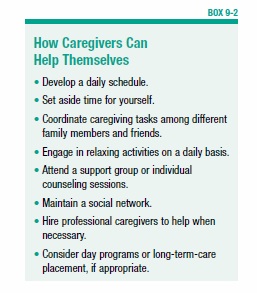9. Handling Caregiver Stress
When a family member or close friend has Alzheimer’s disease, the focus of attention naturally shifts to the needs of the person with the condition. Decisions must be made about living arrangements, caregiving, and financial and legal matters. The people who will be caregivers must learn how best to assist the person as the disease continues to worsen.
While it’s certainly important to do everything you can to be a helpful advocate and caregiver, it’s equally important not to neglect yourself. Caregiving can be time-consuming and stressful. The stress may be compounded by financial strain, because many services required by people with Alzheimer’s disease are not covered by Medicare or health insurance.
As your caregiving role increases, you may have less free time, experience frequent interruptions at work, and find it hard to deal with your own health and interests. You might have trouble sleeping. At times you may feel angry, lonely, bitter, and resentful (see Box 9-1, “Typical Responses to Caregiving”). These are normal feelings, and you shouldn’t feel guilty about having them.
It’s helpful to have a support group, such as close friends and family; a church, synagogue or other spiritual community; or an organized support group of caregivers. By expressing your emotions among supportive individuals, you’re less likely to take them out on the person with dementia. Support groups also can be valuable sources of information, and they offer a safe and accepting environment in which to share your experiences.
Counseling for Caregivers
You might also consider seeking individual counseling with a social worker or psychologist. For many people, the stress of caregiving can be exhausting. For some it leads to depression when the demands of caregiving become overwhelming. This is not unusual; nearly half of all caregivers become depressed at some time.
Many people reach a point at which they simply can’t handle the stress and must move their loved one to a nursing home or other facility. Researchers have found, however, that caregivers who receive support and counseling not only are able to keep the Alzheimer’s patient home longer, but they are also less stressed.
One study found that Alzheimer’s patients whose spouses received counseling and support were able to remain at home for 1.5 years longer before being placed in a nursing home than patients whose spouses did not receive counseling. The caregivers who had access to counseling and support were better able to tolerate the patients’ memory and behavior problems, were more satisfied with support from family and friends, and had fewer symptoms of depression. A follow-up to this study found that spouse caregivers who received counseling and support were better able to preserve their own health.
Caregivers often have a tendency to neglect their own health. In addition to depression, caregiver stress can make people susceptible to other medical problems, such as hypertension, irritable bowel syndrome, migraines, heart problems, and ulcers. One study found that older adults caring for a family member with dementia were at higher risk for cognitive impairment and dementia themselves. That’s why it’s important for you to keep up with regular doctor visits. Continue to eat a healthy diet, get plenty of rest, and exercise regularly. Consider simple exercises, such as brisk walking, swimming, or jogging, on most days of the week (see Box 9-2, “How Caregivers Can Help Themselves”).
Caregiver Stress
How you deal with the stress of caregiving will depend to some degree on your personality and the way you cope with stress. People with a take-charge attitude may experience less stress, for example. However, the complexities of caregiving can make coping difficult for just about anyone.
A need to learn new skills might magnify your stress. For example, a husband may have to learn to cook, and manage his wife’s former household tasks. If the spouse who handled the finances and wrote the checks is the one to develop Alzheimer’s disease, the other partner might have to take a quick course in basic finances.
Above all, don’t try to do everything yourself. Caregiving is too big a job for one person. Get the help you need from family, friends, home attendants, support groups, adult day programs, and respite care. Find out what resources are available in your community from senior centers or your local agency on aging. Ask family and friends to visit and help out. Getting support will help both you and your loved one feel less socially isolated. Working together will help ensure that the person with Alzheimer’s gets the best possible care.
Caregiving doesn’t have to be a negative experience. In fact, many people derive an increased sense of purpose from their new responsibilities, and they grow emotionally. Take care of yourself, take one day at a time, and allow people to help you. Focus on and enjoy what your loved one can still do. Perhaps most importantly, don’t lose your sense of humor. A little humor can get you through some rough situations, and it makes life a lot more fun. Alzheimer’s disease doesn’t remove a person’s sense of humor. So laugh with your loved one. You’ll both enjoy it.
The post 9. Handling Caregiver Stress appeared first on University Health News.
Read Original Article: 9. Handling Caregiver Stress »
Powered by WPeMatico



